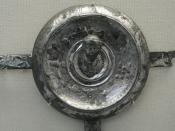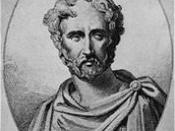Pliny and Juvenal: An Analysis
Both Pliny and Decimus Junius Juvenalis, or Juvenal for short, were extraordinary people of ancient Rome. Although Pliny and Juvenal had different ideas about what Roman life was truly like, when reflecting on these two pieces together a person, he or she should see the paradox and get an idea of what Roman life was like. Pliny was enthralled by the beauty and splendor of upper class. Juvenal was contending with lower class troubles during the time of imperial Rome. Juvenal and Pliny both make many interesting points about Rome.
Pliny's interesting points that he made were always biased in the sense they emphasized Rome's worth and beauty. He starts by giving a basic overview of how the city is laid out, which "is divided into fourteen districts", has 265 crossroads, and "no other place in the world can vie with it in size"(Pliny).
Rome actually wasn't as big as Pliny would suggest with this, but he does admit that it is only "26 miles" if you draw "a straight line from the mile column placed at the entrance to the forum to each of the gates, which are at a present thirty-seven in number", and it is a circle because Pliny tells the measurement of the "circumference" of the city (Pliny). Pliny gives great details that really describe what the city is proud of. One achievement they are particularly proud of is the "seven 'rivers' made to flow, by artificial channels, beneath the city" (Pliny). They are proud of their sewer system because no other city has an advanced one like it.
While Pliny tells all of the achievements of Rome Juvenal tells all of Rome's faults. Juvenal describes Rome as a disastrous place that no decent person would want to live...



Superb
Well written essay that flowed smoothly. Very interesting and kept my attention throughout. Provided great information.
9 out of 9 people found this comment useful.